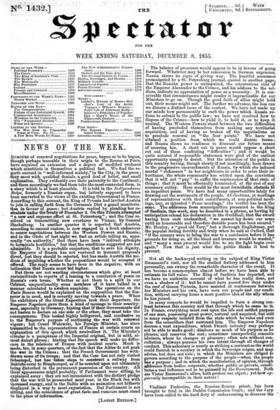NEWS OF THE WEEK.
RUMOURS of renewed negotiations for peace, begun or to be begun, though perhaps traceable in their origin to the Bourse at Paris, have acquired an extension and a degree of modified credence which constitute in themselves a political fact. We find the re- ports current in "well-informed society," in the City, in the press ; they meet with qualified denials, a good deal of belief, and small explanation. They evidently owe their paternity to the Continent ; and there accordingly we find them take the most connected form, in a story which is at least plausible. It is told in the Indtlpendanee Beige, formerly a Russian organ, but latterly supposed to have been converted to the views of the existing Government in France. Aocording to this account, the King of Prussia had invited Austria• to join in calling forth from the Germanic Diet a grand manifesta- tion in favour of peace ; but Austria replied by pleading her re- straints under the treaty of December 2. On this Prussia attempted ",. a new and supreme effort at St. Petersburg "; and the Czar re- solved on transmitting new overtures to Vienna, by General Stackelberg. In another quarter it is reported that Austria, according to annual Custom is now engaged in a fresh endeavour to renew negotiations between the Western Powers and Russia ; and in the Globe of last night we find an article telling us, appa- rently "on authority," that there have been "indirect attempts to terminate hostilities," but that the conditions suggested are not admissible. It is a probable conjecture, that to save his dignity, the Emperor of Russia has not ventured to transmit proposals direct, -lest they should be rejected, but has made Austria the me- dium of inquiring hether the propositions would be accepted if
i offered. The re y seems to have been in the negative, with an intimation that mania must bid higher.
But there are not wanting circumstances which give at least verisimilitude to reports of a leaning to a conclusion of peace on Russia's own terms. Whether or not there is a split in our Cabinet, unquestionably some members of it have talked in a Manner calculated to awaken suspicion. The operations on the Paris Bourse would be explained on the supposition that the Ein- peror is in need, and is covertly moving towards a peace. When the exhibitors of the Great Exposition took their departure, the Emperor Napoleon gave them a kind of message to their country- men, especially in Germany, hinting that if their Governments did not hasten to declare on one side or the other, they must take the consequences. This looked highly belligerent, and conclusive as to the Emperor's purpose of continuing the war with renewed vigour; but Count Walewski, his Foreign Minister, has since transmitted to the representatives of From* at certain courts an explanation of this speech which neutralizes it. The Minister's circular is a paraphrase of the Imperial original, but in mild, al- most dulcet phrase; hinting that the speech will make no differ- ence in the relations of France with neutral courts. Much is made, too, in some quarters, of the fact that the Allies do not push the war in the Crimea; that the French Government has with- drawn some of its troops; and that the Czar has not only visited Sebastopol, but has taken steps to construct a railway from Baktohi-serai to Simpheropol, as if he counted upon not ultimately being disturbed in the permanent possession of the country. All these appearances might probably, if Parliament were sitting, be explained away : they are not inconsistent with the distinct pledge
that the war will be seouted next ear in the Black Sea with
P" y , i
increased energy, and n the Baltic with an animation not hitherto displayed in a way to meet expectation. But Parliament is not Vladimir Peoherine, the Russian-Roman priest, has been sitting, and the coincidence of great facts and rumours must stand brought to trial in the Dublin Commission Court ; and the Jury


































